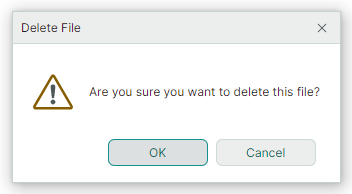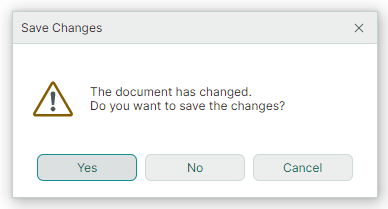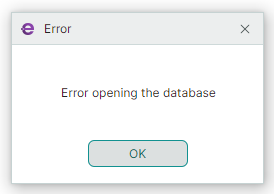MxMessageBox
The MxMessageBox dialog allows you to display messages and ask simple questions to users.

MxMessageBox supports Eremex paint themes. It is correctly rendered in the light and dark theme variants.
Use the static MxMessageBox.Show method overloads to display a dialog. The MxMessageBox.Show methods return the result of the dialog (the button clicked by a user).
Show Method Overloads
Two MxMessageBox.Show method overloads are available:
public static MessageBoxResult MxMessageBox.Show(Window? owner, string text, string? title = null, MessageBoxButtons buttons = MessageBoxButtons.Ok, MessageBoxIcon icon = MessageBoxIcon.None, MessageBoxResult defaultButton = MessageBoxResult.None, Action<MxMessageBox>? configure = null)
owner — The window that will own the message box. If this parameter is
null, theMxMessageBoxautomatically identifies the owner: the owner is the last active window, or the application's main window.text — The text to display in the dialog.
title — The dialog's title.
buttons — An
Eremex.AvaloniaUI.Controls.MessageBoxButtonsenumeration value that specifies buttons to display in the dialog. Available values include:Ok,OkCancel,YesNoCancel,YesNo,AbortRetryIgnore,RetryCancelicon — One of the predefined icons to display before the text. Set the property to
MessageBoxIcon.Noneto hide the icon.defaultButton — Identifies the default button. The default button is the one that is initially focused when the dialog is displayed. When a user presses ENTER, the default button is clicked.
configure — A delegate to perform additional dialog customization (for instance, the dialog's icon in the title bar, or the alignment of buttons).
Example
The following example displays a message box with three buttons - Yes, No and Cancel.

MessageBoxResult result = MxMessageBox.Show(null, "The document has changed."+ Environment.NewLine+ "Do you want to save the changes?", "Save Changes", MessageBoxButtons.YesNoCancel, MessageBoxIcon.Warning, MessageBoxResult.Yes); if (result == MessageBoxResult.Yes) { //... }
Another MxMessageBox.Show method overload contains only one parameter.
public static MessageBoxResult MxMessageBox.Show(Action<MxMessageBox> configure)
configure — A delegate to customize the dialog.
Example

var res = MxMessageBox.Show(configure: msgBox => { msgBox.Text = "Error opening the database"; msgBox.Title = "Error"; msgBox.Buttons = MessageBoxButtons.Ok; msgBox.ButtonAlignment = Avalonia.Layout.HorizontalAlignment.Center; msgBox.Window.Icon = new WindowIcon(AssetLoader.Open(new Uri("avares://DemoCenter/Assets/EMXControls.ico"))); });